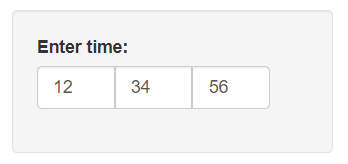

shinyTime provides a timeInput widget for Shiny. This
widget allows intuitive time input in the [hh]:[mm]:[ss] or
[hh]:[mm] (24H) format by using a separate numeric input
for each time component. Setting and getting of the time in R is done
with date-time objects.
# Install from CRAN
install.packages("shinyTime")As the shinyTime package mimics the existing shiny
functionality, using the package is easy:
ui <- fluidPage(
# Using the default time 00:00:00
timeInput("time1", "Time:"),
# Set to current time
timeInput("time2", "Time:", value = Sys.time()),
# Set to custom time
timeInput("time3", "Time:", value = strptime("12:34:56", "%T")),
# Use %H:%M format
timeInput("time4", "Time:", seconds = FALSE)
# Use multiples of 5 minutes
timeInput("time5", "Time:", minute.steps = 5)
)Note that setting an initial value is done with a date-time
object, in the same way as setting a date in dateInput
can be done with a Date object.
The value retrieved will also be a date-time object. You need to convert it to character to be able to show the time, as the default character representation does not include time. For example:
server <- function(input, output) {
# Print the time in [hh]:[mm]:[ss] everytime it changes
observe(print(strftime(input$time1, "%T")))
# Print the time in [hh]:[mm] everytime it changes
observe(print(strftime(input$time4, "%R")))
}For a demo, visit the online example
app or try the shinyTime::shinyTimeExample()
function.